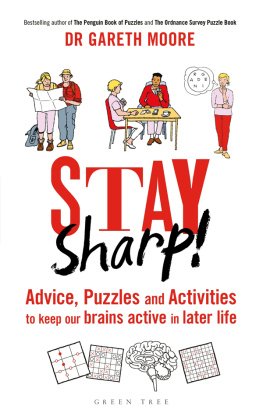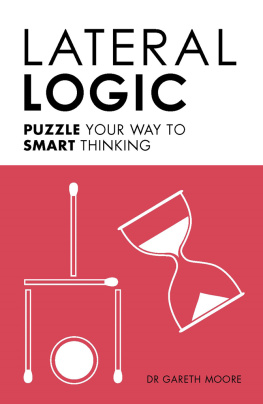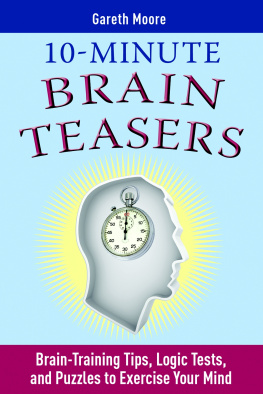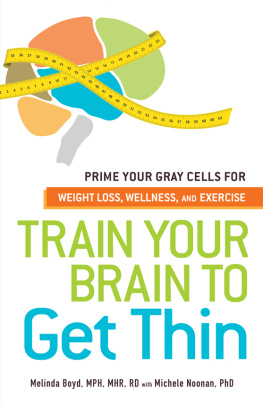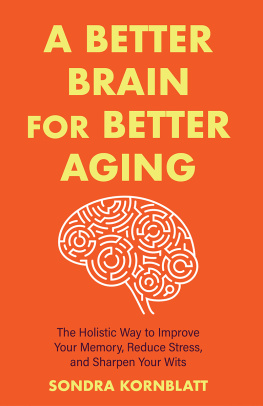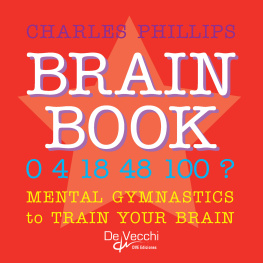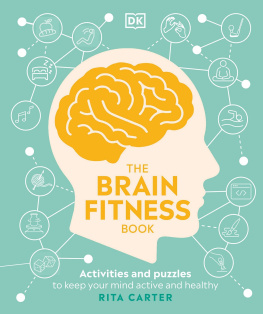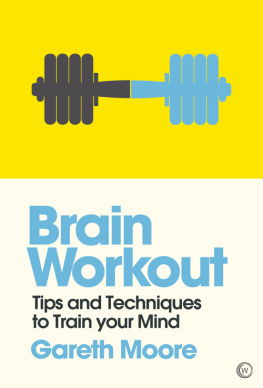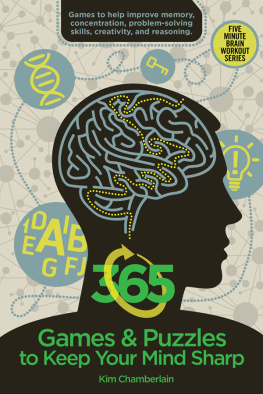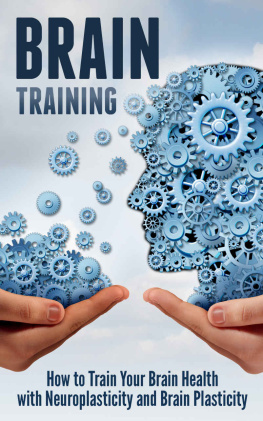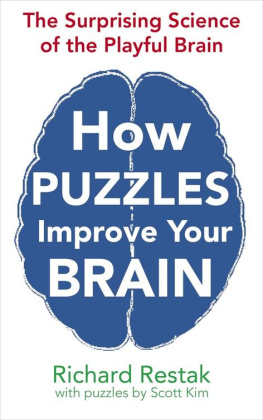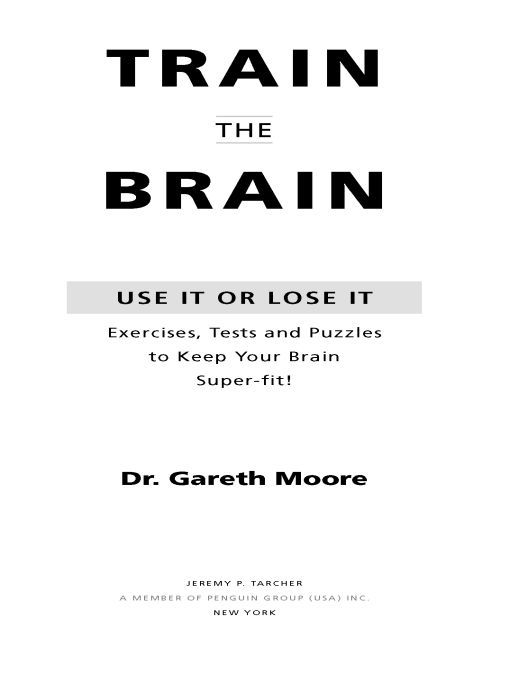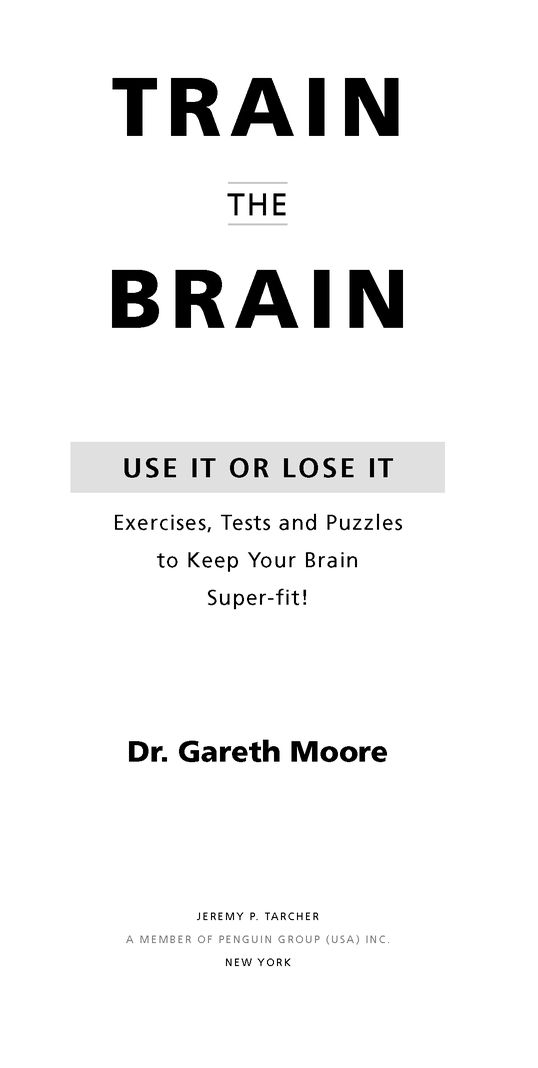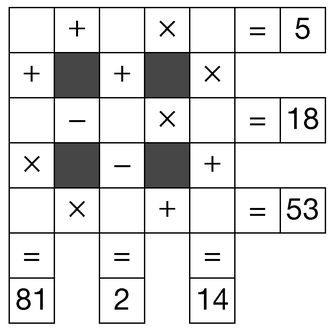Table of Contents
INTRODUCTION
Important brain functions such as memory, attention and processing speed can all be improved by training. If you want to remember more, concentrate better and think faster, start training your brain todayfight the mental flab and help ensure you use it rather than lose it!
Brain training is for everyone, from young adults through to the elderly. Continually challenging your brain encourages it to grow and developand, unlike a visit to a physical gym, entering the mind gym brings with it no risk of injury and no need for specialized equipment. Just yourself, this book and a pencil will start you off on the path to a mentally fitter you. So sharpen your pencil and sharpen your brain!
A number of factors affect your brains efficiency. Food is one example. The brain has around one hundred billion neurons and each of these cells relies for its performance on the complex mix of minerals and vitamins we eat. Its probable that a diet high in mono- and polyunsaturated fats, found in both fish and olive oil, is good for our brains. Vitamin E, polyphenols and antioxidants may also help us avoid mental declinecitrus and dark-skinned fruits and vegetables are good choices.
Numerous studies have also shown that skipping breakfast is bad news for our brainpower throughout the dayand its not ideal for the rest of the body either! A high-fiber breakfast that steadily releases glucose is good, such as beans on toast, for example. Sugary snacks and fizzy drinks for breakfast, however, have been shown to result in childrens having poor memory and brief attention spans.
As well as a balanced diet, physical fitness is an important part of maintaining good mental well-being. Keeping the blood flowing is one of the best ways to help new brain cells grow, and cardiovascular health is important for preserving what you already have. You dont need to be super-fita sedate half-hour walk just three times a week can go a long way to improving your mental faculties, compared to a sedentary lifestyle.
Minimizing stress wherever possible is also a good way of avoiding mental decline. In fact, studies have shown that difficult decisions are often best solved by taking a break, and even by sleeping on themour brains continue to process thoughts without us being actively conscious of the fact, and new ideas often occur to us when we are at our most relaxed. So sleep on that tough problem and youll not only minimize the stressyou might solve it, too.
Some things arent good for our brainsnicotine and alcohol, as well as other drugs, are bad for our mental health. Try to cut down on trans-fatty acids, found in cakes, pastries and biscuits, which may contribute to a range of mental problems. Our brains are sixty percent fat and trans-fats could clog them up.
A lack of sleep is definitely not good for you, either. If you have been awake for twenty-one hours straight then you are likely to have the degraded mental faculties of someone who is legally drunk. Successive late nights and early mornings can also have the same effect. Conversely, an extra hour or two in bed can help you concentrate and stay attentiveso an early night the day before an important interview or exam is a good plan.
Whats particularly interesting is that studies suggest improvements from brain training dont just go away as soon as you finish the program. Research has shown that measurable gains can last not just months but many years, particularly for memory-training. A recent study of elderly people even revealed that brain training can result in memory performance equal to that of people over ten years younger.
With so much evidence in favor of brain training, you might wonder why we dont all do it every day. Perhaps you already dosomething as simple as reading regularly has been shown to help. In fact, the real question in brain training is not whether your brain can be trainedthere is plenty of scientific evidence that it canbut how best to go about doing it. Thats why this book has been carefully designed to contain a wide range of tasks that exercise many different areas of your brain. And hopefully youll have fun on the way to a sharper, smarter and faster you!
HOW TO USE THIS BOOK
This book is packed full of a variety of brain-training tasks. It is broken down into three sections and as you progress the tasks become somewhat trickier, so for maximum benefit its best to start at the beginning and work your way through.
You should try to avoid skipping any of the puzzles or tasks, particularly if the reason is simply that you find them trickythese are almost certainly the tasks that will be of most benefit to you. For example, if you find the memory challenges hard then this might mean you will have the most noticeable improvement from completing those tasks. If they really are too difficult then start by trying to remember just a few of the words and take it from there. Or, if youre truly stuck on a puzzle, turn the page and take a peek at the answer for a clue. Its meant to be fun and it shouldnt be too frustrating.
Most of the pages will probably only take you a few minutes to complete. Some might take you a little longer, and others will be quicker to do. Try to spend ten minutes or so each day on the tasksperhaps two or three pages per day, depending on how hard you find the puzzles.
If you complete all the pages in the book you should be well on the way to a better mental you. For further challenges try some of the logical puzzles on my website, www.puzzlemix.com.
Good luck!
Which of these countries is the odd one out, and why?
Morocco, because all the other countries are on the continent of Europe.
Which number comes next in this sequence?
13comes next. Each number is the sum of the preceding two numbers.
On Tuesday I went to the bank, two days after I had gone shopping, which was in turn six days after my dental appointment. On which day of the week did I see the dentist?
Monday.
If its 5:40p.m. in Britain then it is 12:40p.m. in New York since New York is five hours behind. If it is the following times in Britain, what time is it in New York?
If I roll a normal six-sided die, what is the likelihood that I roll 3 twice in a row?
1 in 36, which is 1 in 6 times 1 in 6.
Recall the animals:
Can you place the numbers 1 to 9 into each of the empty boxes so that no number is used more than once and so that each of the arithmetic equations reading both across and down is correct?
You dont need to guessonly logic is required!


